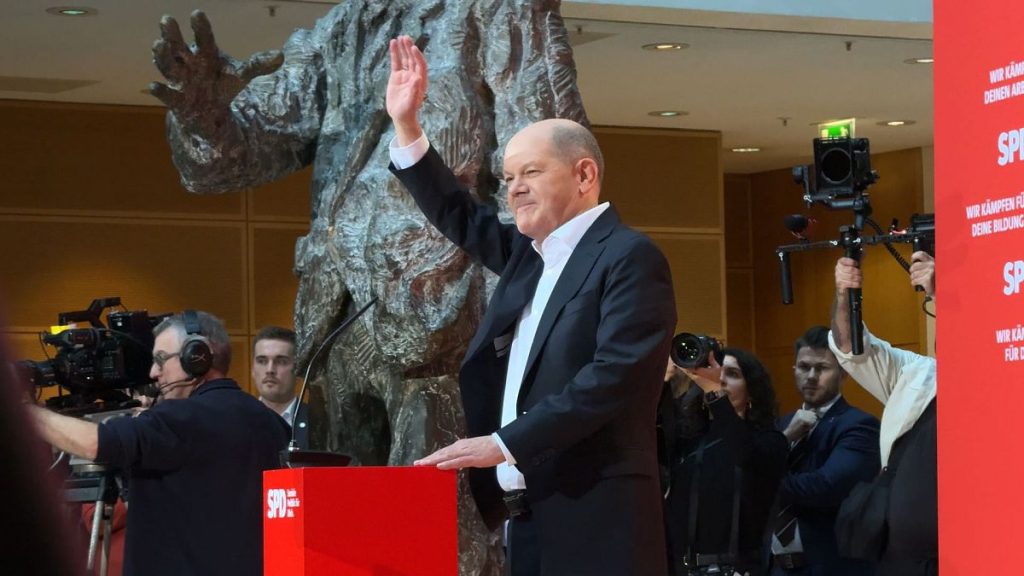Chancellor Olaf Scholz has emphatically presented the Social Democratic Party (SPD) as the genuine representative of the citizenry, launching a vehement critique of the leading opposition, the Christian Democratic Union (CDU), which is currently at the forefront of polls in Germany. This strategy comes as the SPD gears up for upcoming snap elections next year, underscored by the party’s recent “election victory conference” in Berlin. With protesters outside demanding the immediate prohibition of the far-right Alternative for Germany (AfD), the SPD leadership took the opportunity to rally support and reinforce their commitment to prioritizing the welfare of the German populace. Vocal leaders such as Saskia Esken and Lars Klingbeil articulated a determined vision for the party, seeking to reclaim their narrative as defenders of the working class while confronting the challenges posed by rising right-wing sentiments.
During the conference, Chancellor Scholz made a pointed distinction between the current CDU leadership under Friedrich Merz and the former chancellor Angela Merkel, asserting that the CDU has drifted away from its traditional social values. He cautioned voters about the potential dangers posed by the CDU’s conservative policies, particularly regarding pensions, framing these changes as a significant shift away from what many Germans have come to expect in terms of social support and security. The SPD leadership’s assessment of the CDU is not merely political rhetoric but a strategic maneuver aimed at underscoring the importance of social cohesion, especially in an era marked by economic uncertainty and an increasingly polarized political landscape.
In addition to attacking the CDU, Scholz and Esken criticized the Free Democratic Party (FDP), contending that their actions have deliberately undermined the coalition government. This criticism intensified following revelations that the FDP had harbored intentions to exit the government coinciding with the U.S. elections, raising concerns about the stability of the current administration. The SPD seems intent on portraying itself as the party of stability and social responsibility amidst what they perceive as reckless political maneuvering by their coalition partners. The atmosphere at the conference, characterized by enthusiasm and applause from SPD members, reflects a party seeking to reinvigorate its support base despite currently trailing behind both the CDU and the far-right AfD in public opinion polls.
Chancellor Scholz took the opportunity at the conference to outline the core priorities of the SPD should they secure re-election. He emphasized the urgency of addressing pressing issues like affordable housing and job preservation, particularly in light of alarming announcements of significant job cuts from major corporations, including Volkswagen and ThyssenKrupp. This focus on economic stability is a crucial strategy for the SPD to reconnect with voters who are grappling with the realities of a struggling economy. By aligning their electoral platform with the immediate concerns of German workers, the SPD is attempting to present itself not only as a viable alternative to the CDU and AfD but as the only party authentically committed to social welfare.
In a notable deviation from previous EU positions, Scholz also pledged to protect German companies from potential fines related to failing emission standards, marking a clear effort to assert German interests against what he perceives as overreach by Brussels. This promise to shield German businesses, coupled with calls for tariff negotiations with China, signals a shift towards a more nationalist economic policy that seeks to prioritize domestic industry in a globalized economy. By distancing the SPD from the EU’s stringent regulatory framework, Scholz aims to forge a connection with voters who may feel that current EU policies are detrimental to German economic interests.
Despite criticisms of its electoral strategy, particularly concerning aggressive campaigning on social media, the SPD seems resolute in adopting a more proactive and offensive approach to secure voter loyalty in the face of mounting challenges. As right-wing parties like the CDU and AfD gain prominence both in Germany and across Europe, social democratic parties find themselves increasingly isolated. The SPD’s effort to project itself as the inclusive and socially progressive alternative to the conservative right underscores the existential challenge they face in re-establishing relevance in the current political climate. As the upcoming elections loom large, the SPD’s ability to navigate this complex political landscape will be crucial in defining the future direction of German politics.

